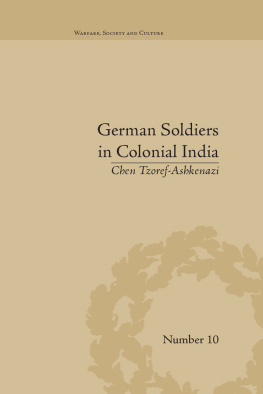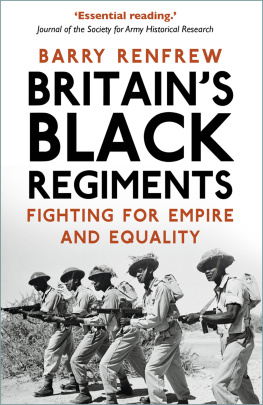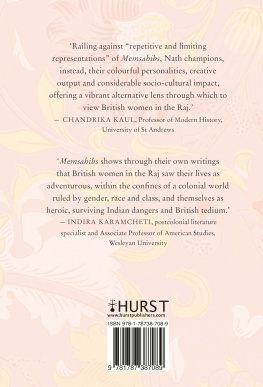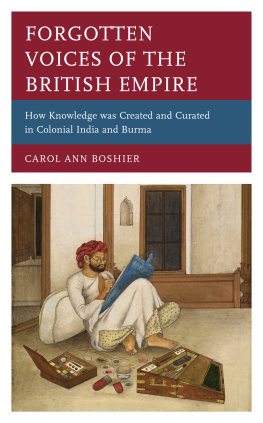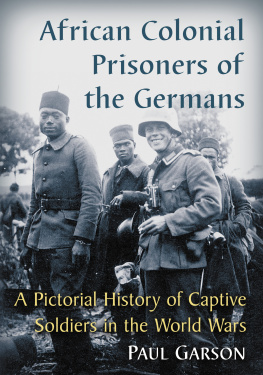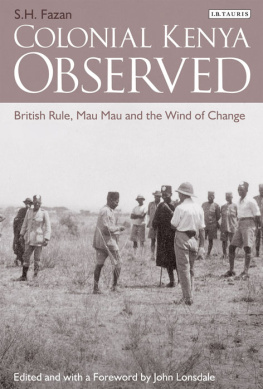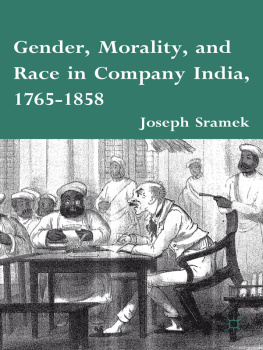GERMAN SOLDIERS IN COLONIAL INDIA
WARFARE, SOCIETY AND CULTURE
Series Editor:Frank Tallett
David J. B. Trim
TITLES IN THIS SERIES
1 Military Economics, Culture and Logistics in the Burma Campaign,
19421945
Graham Dunlop
2 Orde Wingate and the British Army, 19221944
Simon Anglim
3 The Jacobite Campaigns: The British State at War
Jonathan D. Oates
4 Arming the Royal Navy, 17931815: The Office of Ordnance and the State
Gareth Cole
5 Militant Protestantism and British Identity, 16031642
Jason White
6 The 1641 Depositions and the Irish Rebellion
Eamon Darcy, Annaleigh Margey and Elaine Murphy (eds)
7 Citizen Soldiers and the British Empire, 18371902
Ian F. W. Beckett (ed.)
8 Military Manpower, Armies and Warfare in South Asia
Kaushik Roy
9 Alexander Leslie and the Scottish Generals of the Thirty Years War,
16181648
Steve Murdoch and Alexia Grosjean
FORTHCOMING TITLES
Worship, Civil War and Community, 16381660
Chris R. Langley
GERMAN SOLDIERS IN COLONIAL INDIA
BY
Chen Tzoref-Ashkenazi
First published 2014 by Pickering & Chatto (Publishers) Limited
Published 2016 by Routledge
2 Park Square, Milton Park, Abingdon, Oxon OX14 4RN
711 Third Avenue, New York, NY 10017, USA
Routledge is an imprint of the Taylor & Francis Group, an informa business
Taylor & Francis 2014
Chen Tzoref-Ashkenazi 2014
To the best of the Publishers knowledge every effort has been made to contact
relevant copyright holders and to clear any relevant copyright issues.
Any omissions that come to their attention will be remedied in future editions.
All rights reserved, including those of translation into foreign languages. No part of this book may be reprinted or reproduced or utilised in any form or by any electronic, mechanical, or other means, now known or hereafter invented, including photocopying and recording, or in any information storage or retrieval system, without permission in writing from the publishers.
Notice:
Product or corporate names may be trademarks or registered trademarks, and
are used only for identification and explanation without intent to infringe.
BRITISH LIBRARY CATALOGUING IN PUBLICATION DATA
Tzoref-Ashkenazi, Chen author.
German soldiers in colonial India. (Warfare, society and culture)
1. Soldiers India History 18th century. 2. Germans India History 18th century. 3. India History British occupation, 17651947.
I. Title II. Series
355.3095409033-dc23
ISBN-13: 978-1-84893-367-5 (hbk)
Typeset by Pickering & Chatto (Publishers) Limited
CONTENTS
This book grew out of my work on Friedrich Schlegels Indological studies, through which I learned of the participation of his elder brother Karl August in the expedition of two Hanoverian officers to India. I was intrigued by the fact that Schlegel mentioned his brother, who died in Madras in 1789, in the introduction to his ber die Sprache und Weisheit der Indier (1808) but otherwise seemed quite uninterested in the experiences of his brother in India, a country to which both Friedrich and his brother August Wilhelm devoted so much intellectual energy. The initial interest turned into a postdoctoral project conducted at the South Asia Institute in Heidelberg, headed by Gita Dharampal-Frick. The research would not have been possible without the generous support of the Minerva Foundation in Munich.
I was lucky to begin the research with the greatest expert in the field, and the intellectual inspiration I received from Prof. Dharampal-Frick has indeed been invaluable. In the South Asia Institute I also benefited enormously from discussions with other historians of India, especially Michael Mann, Georg Berkemer and Monica Juneja. Dietmar Rothermund, the former head of the institute and a fountain of knowledge on the German interest in India, was especially helpful. In Berlin I have benefited from the very knowledgeable advice of Jrgen Ltt. I have also enjoyed the friendly support of the staff of the Niederschsisches Hauptstaatsarchiv in Hanover. Discussions with numerous scholars on and after conferences were also very useful. I am grateful for comments by Daniel Krebs and Marie-Cecile Thoral. The remarks of anonymous readers of the journals South Asia, Central European History, History and at Pickering & Chatto, and the editorial suggestions of Dierk Walter, Alison Martin, Susan Pickford, Nir Arieli and Bruce Collins have also been very helpful.
In 1782, two regiments of the army of the Electorate of Hanover with approximately two thousand soldiers sailed from England to India, where they served as auxiliary troops for the British East India Company in the Second Anglo-Mysore War. They participated in one significant battle, the Battle of Cuddalore, in June 1783, after which they served in various missions, including an expedition to the southern parts of the Carnatic and into Mysore in the latter half of 1783. After the war the two regiments stayed in India, mainly in garrison duties. They were also engaged in survey missions and contributed to the mapping of southern India. Due to heavy disease casualties, the two regiments were reinforced by four new companies in 17867 so that altogether 2,800 soldiers were sent from Hanover to India. They stayed there until 17912, when most of the survivors returned home and many of them reintegrated into the Hanoverian Army. Returning officers soon became involved in a new war against France, and many of them joined the Kings German Legion, continuing their military cooperation with the British until 1815. Yet the subject of this book is not the military history of this expedition, which was admittedly marginal to Hanover, India and the British Empire, but the publications of officers from these Hanoverian regiments that appeared in Germany between 1782 and 1807, and how these publications can be used to gain a better understanding of the German discourse on European colonialism, especially British colonialism in India, during the late Enlightenment.
Officers of the Hanoverian regiments began publishing texts on their experiences in India before returning to Germany, in fact even before arriving in India. A significant number of their letters were published in the Hannoverisches Magazin and other popular German periodicals. Their publication indicates Hanovers interest in the fate of the expedition, but also in information about India. After returning from India, two officers, Ludwig von Scharnhorst and Carl Conrad Best, published travel books, and one of the chaplains of the expedition, Friedrich Ludwig Langstedt, became a professional author and translator of books related to travel, world trade and natural history, specializing in India. In addition, two manuscript documents by two of the officers proved useful: a military survey of southern India, prepared by Karl August Schlegel, the elder brother of August Wilhelm and Friedrich Schlegel who were both among the pioneers of German Indology; and a report written by the officer Joseph du Plat. The publications and manuscripts of the Hanoverian officers are interesting not because of their influence on the German discourse and the information they contributed, which were both minor, but rather because of the place they take in the general picture of German writing and publishing about India in the late Enlightenment. Because these works belonged to different genres, they allow us to examine how information about India was being processed in different degrees of sophistication and theorizing. The main strategy of this book is to follow the way the material on India changed while moving between the two axes of experience and theory, beginning with journal articles and moving through to travel books and their reception, followed by analysis of works of history and philosophy of history in which the same or similar historical events were examined. The main analytical perspective is the attitude to British colonialism and Indian society in terms of politics and war rather than religion and culture, since the former were the aspects with which the authors were more familiar. Although most authors also wrote about Hinduism, what they had to say on the political and military circumstances was more interesting since these were topics that stood at the centre of their activity in India.


